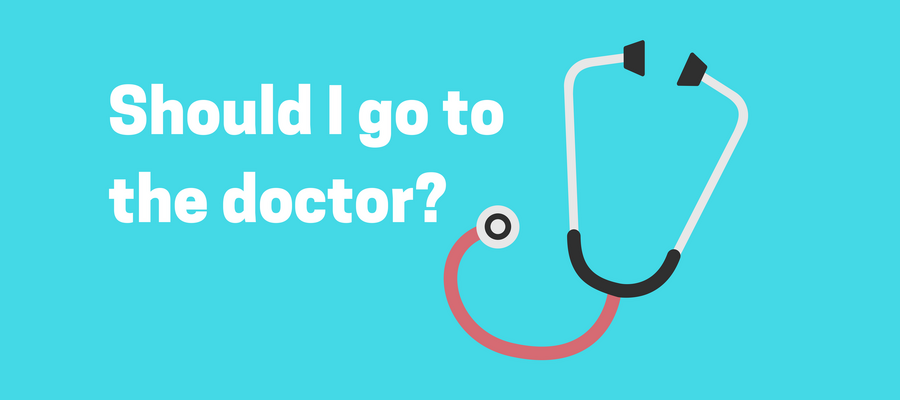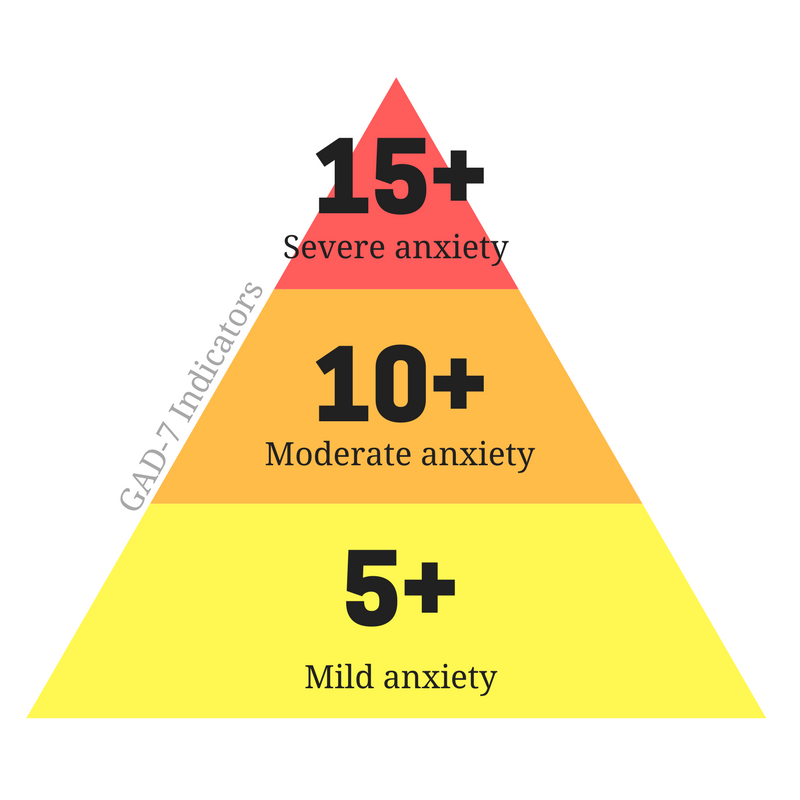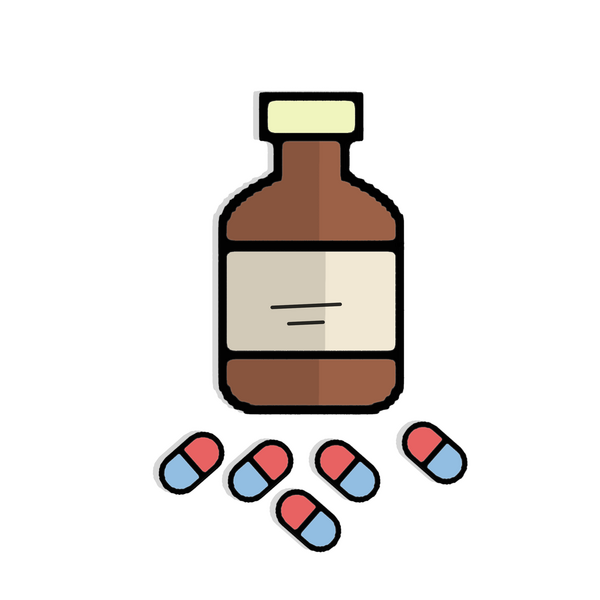
Should I go to the doctor about anxiety?
A question people ask me a lot is:
"Should I go to the doctor about my anxiety?"
Asking yourself this question is common. Why? Because there is a tonne of stuff to think about when deciding to go to the doctor or not. And, as a worrier, you are going to obsess over these reasons more than most.
In this guide, I will take you through all of the pros and cons of going to see your doctor about your anxiety.
How bad is my anxiety?
Often, we're asking ourselves one question: exactly how bad is my anxiety? Is it bad enough to see a doctor?
In a perfect world, the answer would be that you should go if you feel it is bad enough. But going to see your doctor can be a hassle, especially if it has to fit in around work, or maybe it is difficult to get an appointment or costs money to do so.
Therefore, you may be looking for a guide to whether your anxiety is serious enough before booking the appointment.
An easy way to check this is to use the GAD-7. This is an anxiety assessment consisting of seven questions and it is remarkably accurate at diagnosing how serious your anxiety is.
You can take our GAD-7 test online and get your score immediately. Here is what the scores mean:
| Score | Description |
|---|---|
| 0-4 | Healthy levels of worry. |
| 5-9 | Could indicate mild anxiety. |
| 10-14 | Could indicate moderate anxiety. |
| 15+ | Could indicate severe anxiety. |
Such a test is not a replacement for a diagnosis by a doctor. However, it is useful to know your GAD-7 score so that you can discuss it with your doctor in any appointment that you make. Your score will change day-to-day depending on current circumstances and mood.

How do you feel about it?
The most important question is: how do you feel about it? If you believe that anxiety is impacting your life in a significant and meaningful way, it is worth speaking to your doctor about it.
Maybe you cannot hold down a job, or maintain relationships. But life is about happiness, and if anxiety is taking that from you, you have a right to reclaim your life.
Concerns about speaking to your doctor
Even if you think your anxiety is serious enough, there may be other concerns that you are worried about. I address some of the common ones below.
They won't take it seriously
This is a very common worry. Indeed, I had this worry when I first spoke to my doctor about it. I half expected him to say "I have people here dying of cancer, and you are wasting my time because you had to cancel your holiday to Disney Land!"
This is rarely the case, of course. Doctors deal with an array of embarrassing conditions and have enough training and experience to take all of them seriously. Anal bleeding, for example. Or incontinence.
And as for awareness of mental health, this is increasing all of the time. And medical professionals are ahead of the curve.
One in three people will have anxiety and depression in their lives, so doctors are used to people coming to them with these problems.
They won't know what to do
When you see your doctor, they will be a GP: a general practitioner. This is what is sounds like. They do a bit of everything, and you could argue, are a master of none.
This very much an undersell of the knowledge doctors possess. It takes five years to go through medical school, plus two years clinical training, followed by a lifetime of more clinical training. Doctors know their stuff.
But, when you see your GP, they are not a mental health expert. So, to some degree, they may not have the expertise to help you with your specific problem.
However, just like they would not perform surgery themselves, but would refer you to a surgeon, they can refer you to the correct person for mental health, too.
At a minimum, your doctor will have enough knowledge to offer you a diagnosis and refer you to someone who can provide you will the support you need.
They won't be able to help
This is a common concern for people who have been to their doctor before.
Maybe you have already spoken to your doctor, and they sent you for cognitive behavioural therapy (CBT) or gave you some medication, and it did not work for you. So, now you feel reluctant to give it another go because it feels like they cannot offer anything new.
Feeling this way is frustrating.
And it may be that your GP has run out of new options. Though, if so, you should encourage them to take a look at our ultimate list of treatments for anxiety.
However, they may be able to refer you on to specialist mental health services that do offer a wider range of options and things that you have not yet tried.
They will just offer me pills
Many people do not like the idea of taking medication and are worried that their doctor will offer them nothing else, or even pressure them into trying medication.
It is true that medication is often the first point of call for a GP. There are reasons for this:
- Medication is effective.
- They can give you the medication now, whereas referring you for therapy can be a long process that involves you sitting on a waiting list.
- Medication can be used alongside therapy and other treatments.
However, you are in control of your healthcare, especially when it comes to mental health. So, you can set the terms. Be honest with your doctor and tell them that you do not want to try medication.
They will be judgmental
Some people may worry that their doctor will be judgemental or look down on you for having a mental health problem.
In all my years of helping people with anxiety, I have never heard of this occurring. Doctors are professionals, after all, and typically people with a deep desire to help others. It simply doesn't happen.
Reasons to go
Hopefully, the previous section put your mind at ease about speaking to your doctor. In this section, we will look at the advantages of doing so.
They can offer solutions
First and foremost, a great reason to go to your doctor is that they will be able to offer you a remedy for your anxiety. This could be a range of different options, and I will discuss them in a section below.
But, regardless of what they offer, a doctor is there to help you to get better.
They are someone to talk to
Many people feel too uncomfortable or even ashamed to talk about mental health issues with their friends and family.
Your doctor provides you with an impartial third person to talk about such issues with. Someone you can talk through your issues with confidentially.
Reasons not to go
There are few reasons not to speak to your doctor about your anxiety. However, there are a couple, and I will mention them here.
It will be on your medical record
If you are diagnosed with an anxiety disorder, your doctor will record it on your medical record.
What effect could this have?
For the majority of your life, it will have no impact. However, there are a few occasions when you may need to disclose your medical record.
Applying for a gun licence, for example. In the UK, this is unlikely to come up unless you need a shotgun licence. However, in other countries, where guns are more common, this maybe more of an issue.
Legal restrictions vary from country to country. Again, in the UK, having anxiety or depression does not necessarily block you from obtaining a gun licence if you can demonstrate you have sought treatment.
Another example is if you are planning to adopt. Adoption agencies will typically want to go through your history with a fine tooth comb, including your medical history.
The logic of living a child living in care rather than settling them with a loving family could seem a strange choice. However, again, it is not typically a blocker if you have sought treatment.
It becomes a pre-existing condition
Pre-existing medical conditions can affect your insurance. This includes:
- Private health insurance
- Travel insurance
- Life insurance
- Income protection
It is unlikely that you will be refused cover because of anxiety. However, an insurer could choose to increase your premium. Or, more likely, they will exclude any anxiety-related issues from your policy.
Some insurers will give you the choose between an exclusion and a higher premium. There is no black and white: it varies depending on the individual insurance.
Some policies, for example, may allow you to review the exclusion after a year if no symptoms have appeared. There really is no clear line here; each insurer sets their own policies.
What your doctor can do
Before heading to your doctor, it is worth considering what you hope to get out of it. Your doctor can offer a lot of advice and answers, but their options are not unlimited, and it is worth keeping this in mind when going to see them.
Offer you a diagnosis
First and foremost, your doctor may be able to offer you a diagnosis.
This is important because you want to be tackling the right problem. Many people struggle with anxiety for years while thinking they have depression, for example. And the line between OCD and anxiety is a thin one.
It maybe the case that they need to refer you to a specialist for a detailed diagnosis. But, in either case, they are the gatekeeper to diagnosis.
Refer you for therapy
Your doctor may also be the gatekeeper to accessing therapy.
This is particularly important in countries with universal healthcare systems (most first world countries) as you will be able to access therapy services for free, or subsidised by the national healthcare provider.
The downside of this is that there will typically be a roadmap you have to follow. In the UK, for example, you will almost always be sent for cognitive behavioural therapy, regardless of whether you think it is effective or not (though, of course, the evidence says that it is).
Prescribe medication
Only a doctor can prescribe medication. Therapists and counsellors do not have the power to prescribe, but your GP or a psychiatrist does.
This could include the range of antidepressants used to treat anxiety. But it could also include medication to help you through any related problems as well, such as prescribing sleeping tablets if you are unable to sleep.

Offer advice and understanding
Additionally, your doctor maybe be able to provide a better understanding of your current situation, making you feel less alone, and referring you to self-management resources.
You could just find these on the internet, of course, but your doctor is likely to know what the best resources are. Maybe online resources are not backed by medical evidence, and your doctor may be able to direct you to some that are.
Alternatives
If you decide not to go to your doctor, there are lots of other options you can pursue instead. Below, I have picked out some of the best ones.
Self management
Mild, and in some cases moderate anxiety, can be self-managed. This could include:
- Learning more about anxiety
- Learning cognitive behavioural therapy techniques
- Developing a mindfulness routine
- Leading a healthier lifestyle
Reading this website is a great way to increase your understanding and knowledge of anxiety. And with knowledge, comes power.
If you are looking to learn more about mindfulness, see our mindfulness page. If you want to learn about how you can use exercise, diet and healthy living to reduce your anxiety, see our book Do More, Worry Less.
Access therapy directly
You do not have to go through your doctor to access therapy. You may be able to access it directly. In the UK, for example, you can self-refer to local mental health services. Or, if you have the money, you can access therapy privately.
Private therapy has several advantages:
- You can typically skip waiting lists and access it immediately
- You can choose the type of therapy you want
- You can choose the therapist you want to work with
- You are not time-limited to a set number of sessions
Cognitive behavioural therapy is the most widely used treatment, but some people prefer other approaches, such as a more talk-based therapy. For a complete list of your options, see our list of treatments for anxiety.
If you do not have the budget for private one-to-one therapy, you could look at group therapy, or see if you can access free or discount services from local charities.
Support groups
Support groups are groups of people with similar issues who come together to provide mutual support and encouragement.
They do not provide treatment in themselves, but many people find it useful to be able to talk through their problems in a group of other people who will understand and sympathise. It is a great opportunity to talk through different solutions and find out what has worked for other people.
Support groups are typically run by local charities or individuals, so the best way to locate them is by searching the web or asking anxiety charities in your country if they maintain a list of local support groups.
Alternative therapies
If conventional therapies do not work, you can look to the world of alternative medicine. These treatments typically have little evidence to support them, or in many cases, convincing evidence that they do not work.
However, if you have tried everything else, or really want to avoid a trip to the doctor, they could be worth a try.
Options include:
- Herbal remedies
- Hypnotherapy
- Yoga
- Pilates
- Homoeopathy
- Acupuncture
- Reflexology
Conclusion
Speaking to your doctor about anxiety is usually a good idea. Above, I laid out the many benefits of doing so.
However, it is also worth considering the disadvantages of telling your doctor and reflecting on the limited number of options they can offer you. If those resonate with you, it may be worth considering the alternatives listed above.
Your doctor is there to help, though, and should be able to offer advice and understanding regardless of your situation.
Metadata
Published 7 August 2017. Written by Chris Worfolk.